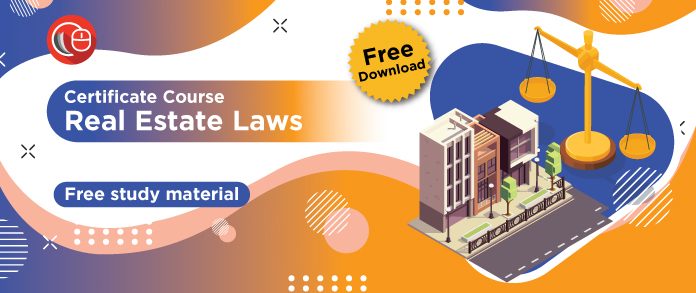This article is written by Ms. Sushree Surekha Choudhury from KIIT School of Law, Bhubaneswar and by Satyaki Deb, an LL.M. candidate from the Rajiv Gandhi School of Intellectual Property Law, IIT Kharagpur. The article gives an insight into the Indian real estate sector and discusses ten skills that you must learn to get started in real estate law with a bang.
This article has been published by Sneha Mahawar.
Indians’ love for real estate is known to the world. If there is one form of asset that every Indian wishes to own in some form or another, it is real estate. Being a traditionalist country, different income classes and age groups of Indians have always preferred real estate investment.
This hyped demand is due to the perspective that real estate is a safer form of investment with almost zero risk and volatility as compared to stock markets, bonds, debentures, etc. This perspective has gained traction in the real estate sector in India.
From wealthy landlords who owned acres of land to wealthy businessmen and property investors, the real estate sector has boomed over the years. People from all income groups in India wish to own real estate in different budget ranges.
Thus, Indian markets have witnessed a wide range and forms of real estate buy and sell transactions, ownership, and investments.
The global pandemic came as an unforeseeable shock to India as well as the rest of the world. The global economy, trade, commerce, business, and employment all suffered.
The real estate sector was no exception. However, the sector bounced back sooner than expected. A surge in demand was witnessed in the sector rapidly post-pandemic with the demand increasing even in the luxury segment.
So, if you are a law student or a lawyer who wants to make a career in the real estate sector, you can learn the following skills and your real estate practice can be a roaring success:-
Table of Contents
Contracts drafting and reviewing
Contracts are one of the most essential parts of any real estate deal. A buying, selling, leasing, mortgaging, letting out, etc., in a property is facilitated through a series of contracts.
A real estate transaction of a big scale may require the signing of a memorandum of understanding between its parties. A development project requires the execution of a development agreement.
The buying and selling of real estate require the execution of a sale agreement between the parties. Leasing land or properties for a particular duration of time is facilitated by a lease agreement.
A temporary possession or tenancy is secured by a tenant’s agreement. Several other agreements take place in the process, such as a broker agreement, a leave and license agreement, etc. These agreements are drafted and executed by a lawyer.
Further, the pre-existing contracts, third-party contracts, vendor agreements, etc., which may exist or will exist, will be reviewed by the lawyers. All of these require drafting and reviewing skills of a lawyer.
Therefore, it is essential for a lawyer in the real estate sector to acquire practical knowledge and develop skills on the contracts that are relevant and necessary in the real estate sector, and they must possess skills in drafting and reviewing them.
For example:- contract expertise in property management, property taxes, drafting MoUs, lease agreements, leave and license agreements, builder-buyer agreements, agreements to sell, joint developer agreements, and analyzing search-title and revenue records of a property to meet legal provisions in the RERA Act, etc., are quintessential skills for a real estate lawyer.
Due diligence and research skills
One of the most crucial skills that a real estate lawyer can and must possess is the skill to conduct due diligence and research. Good research skills can help you stand out in a crowd. The ability to conduct thorough and skilled due diligence is an attribute appreciated by many. The real estate sector is no exception to this necessity. As a sector that involves several regulatory compliances, registrations, and other procedures, etc., it comes with a need to conduct thorough research to understand the prevailing rules and regulations in the market.
Further, when two parties transact with one another in relation to real estate, conducting exhaustive due diligence is a mandatory requirement. The bigger the deal, the greater the need for thorough due diligence. This is to ensure the correctness and truthfulness of the transaction and prevent fraud, misrepresentation, or other illegal activities. Due diligence is required when buying and selling take place between parties. When a buyer wishes to acquire properties of another, stages of research and due diligence, take place in the process. Conducting title search, checking if the taxes are paid, appropriate and undisputed property papers are in place, reports are up to date and in a suitable position, mortgages, debts, or ongoing litigation or arbitrations if any. Therefore, it is crucial for a lawyer to gain and develop their skills in conducting research and due diligence.
Knowledge of state-specific laws, rules, regulations and monitoring policy
While the central legislation, the Real Estate (Regulation and Development) Act of 2016 governs the real estate sector as a whole and makes rules and regulations to monitor and regulate the activities in the sector, there are laws, rules, and regulations that differ from jurisdiction to jurisdiction. These laws and regulations are made by the state governments of each state, and they are applicable to those particular states. These differences are usually in the form of different stamp duties, registration procedures and fees, and other procedural requirements.
For instance, a transaction in the real estate sector in Maharashtra requires adherence to specific laws and regulations in Maharashtra. The procedural requirements demand adherence to the Maharashtra Regional and Town Planning Act of 1996, several standardised building by-laws, Development Control Rules, etc. Therefore, it is important for a lawyer to gain skills and expertise in state-specific laws, rules, and regulations in the jurisdiction in which he or she takes up cases.
It is interesting to know that the Real Estate (Regulation and Development) Act of 2016 has been put as a subject in the Concurrent List of the Seventh Schedule of the Indian Constitution.
Therefore, although all the states have had specific laws relating to real estate specific to their state, they will be applicable only to the extent it is consistent with the Real Estate (Regulation and Development) Act of 2016. State-specific legislation which is inconsistent with the central RERA legislation will be overridden by the central Act.
Therefore, when there is a conflict between the central legislation and the legislation of any state, the central legislation will always prevail. This provision is as per Article 254 of the Constitution of India. For example:- The Maharashtra Housing (Regulation and Development) Act was repealed due to its provisions’ overlapping nature with the central Act.
In addition to these, it is good for a real estate lawyer to have a proper rapport or liaison with government bodies and regulators at various levels in order to understand and predict shifts in policy and regulations.
Learning licensing, permissions, and approvals skills
The real estate sector is one where licensing, permission, approvals, and other statutory and regulatory requirements are enormous. It can sometimes be complex. The procedural requirements are minutely supervised and strictly adhered to.
Permissions and approvals are required from the Real Estate Regulatory Authority at the central level and other authorities at the state level. Apart from this, several other approvals are taken in due process.
When a builder undertakes a land development project, he subsequently needs to acquire several permissions from the government and other authorities. Builders usually find difficulties due to the complexity and number of approvals that are to be taken.
The law has been stricter after the implementation of RERDA and it prevents builders from escaping any approval and licensing. For instance, for starting a development project in, say, Delhi or Gurgaon, one has to get over 50 clearances, permissions, approvals, no objection certificates, etc.
While these permissions and clearances may seem a lot and appear to be chaotic, it has been made so in order to prevent real estate fraud by builders. Getting these permissions, clearances, licenses, and approvals is the work of a real estate lawyer.
A builder needs a lawyer to get all these permits so that he can begin a real estate project. Therefore, a lawyer in the real estate sector must learn these skills. He must know all the procedures that are needed to be undertaken and also the clearances that are required to be taken.
Compliance and risk consulting
Compliances and consulting come as an overall task and skill to incorporate all other skills and mandatory requirements of the job as a real estate lawyer.
The drafting and negotiations, papers and reports, due diligence on a company’s documents, the correctness of their reports, adherence to government norms, statutory requirements, and regulatory compliances, everything is covered by the head of compliance.
Big firms offer these facilities for big bucks of money in India and globally. Lawyers in big firms regularly update themselves with the changing laws and norms to ensure that their client’s project is up to date and compliant with the government’s requirements. The licensing, getting permits and approvals, and other clearances all come within the ambit of compliance.
Builders may choose to hire big firms or independent lawyers to do their compliance work. Compliance is always complemented by risk advisory and business consultancy. A builder or property owner must, at all times, know the compliances he needs to do.
When a builder is on the brink of being non-compliant or has been doing activities that are inconsistent with central and state laws, his project is at risk of getting backlashed by the government.
At this point, it is the duty of the lawyer to advise and give consultancy services to his client on potential risks and help him mitigate the consequences of non-compliance. Therefore, a real estate lawyer must possess these skills that will help him keep track of all regulatory and compliance-related requirements of his clients and should stay updated on such laws and regulations at all times.
Knowledge of intellectual property laws
This is an important but highly underrated skill for any real estate lawyer. While dealing with real estate, a lawyer should definitely ask these questions to his clients:-
- Does your real estate have a distinct name or trademark or logo?
- How well-known is the trademark of your real estate? (This can increase the valuation of your real estate)
- Are there any pending disputes regarding your logo or mark? (Besides pending disputes in civil courts, pending IP disputes can also bring down the valuation of your real estate)
- Is there any website or mobile app or desktop application associated with your real estate?
- Does your client own the domain name of your real estate or is he a victim of cybersquatting? (Domain name of your client’s real estate can be sold separately or together with the physical property or the website may be deactivated partially/totally)
- Are there any copyrighted marketing materials that the new owner will need?
Basically, the real estate lawyer should ensure that the client’s estate’s IP is smoothly taken care of too during any sort of agreement by strategically inserting proper IP clauses in the deeds.
Dispute resolution skills
Needless to say, dispute resolution skills are essential in every part of the law and in life. Disputes arise every day. Sometimes it is due to a conflict of interests, and sometimes, it is due to a lack of information or misinformation.
In the real estate sector, it may also be due to disputed lands or properties. It may be due to delayed projects. It may be due to intellectual property disputes. Whatever may be the reason, disputes are inevitable but mitigation is always a solution.
Builder-consumer disputes may arise due to the non-performance of contracts and other obligations. It is the duty of the lawyers involved in these transactions to mitigate the risk of disputes and also to resolve disputes that arise between parties. It is advisable to have a dispute resolution clause in all agreements taking place between parties.
In case the parties choose to opt for litigation as a means to resolve disputes, it is the duty of the lawyer to file the motion and defend the suit. Prior to the implementation of RERDA, disputes went to civil courts, High Courts, or consumer courts.
After the implementation of RERDA, these disputes are now heard and resolved by RERA. A real estate lawyer must know the procedure for filing a complaint before RERA and the procedure that it needed to be undertaken.
The real estate lawyer needs to file all the relevant documents of the parties in dispute and the property in dispute with the RERA along with the applicable fees. Thereafter, the regulatory authority disposes of the matter within 60 days.
Thus, a real estate lawyer must possess the skills for effective dispute resolution that can include managing litigation and taking responsibility for the outcome, hiring, instructing and managing external litigators, strategising on how to win cases, how to delay or deflect legal action, whether to settle etc.
Client advisory
A real estate lawyer must possess advisory skills. He must be updated on the laws, regulations, and compliance requirements that are necessary for a builder or developer. With the complexity of the process and new legislation in place, the builder should seek legal assistance at all times.
This helps him to avoid disputes and the risk of litigation due to non-compliance. Client advisory is an integral part of every lawyer’s career. A lawyer must possess advisory skills and he should be able to give important and appropriate advice to his clients on necessary issues and legal implications.
The lawyer must advise his clients on everyday business and also help them mitigate risks with timely bits of advice. The legal advice that a real estate lawyer should be able to give includes legal advice on property management, zoning violations, restrictions and agreements on real estate, property taxes, value estimates, etc.
Negotiation skills
A lawyer must possess good negotiation skills. Negotiation skills are essential when entering into a business deal. Negotiation is essential to guiding the terms and conditions of a buy and sell transaction or any other form of transaction between the parties.
Negotiating real estate transactions puts a better offer on the table. It is also essential while drafting a contract between parties to guide the agreed terms between them. Good negotiation skills can make a deal in favour of the lawyer’s client.
Negotiation skills also come in handy in dispute resolution between parties. Good negotiation skills can prevent losses and save the parties and companies from reputational harm. Therefore, a lawyer must possess negotiation as well as good communication skills.
Effective management and soft skills
A real estate lawyer may also need to perform activities such as team management, Management Information Systems (MIS), reporting and exhibit time management skills, organisational skills, interpersonal skills and great problem-solving skills.
You can learn all these skills from our courses:
https://lawsikho.com/course/certificate-real-estate-rera
https://lawsikho.com/course/diploma-advanced-contract-drafting-negotiation-dispute-resolution
Students of Lawsikho courses regularly produce writing assignments and work on practical exercises as a part of their coursework and develop themselves in real-life practical skills.
LawSikho has created a telegram group for exchanging legal knowledge, referrals, and various opportunities. You can click on this link and join:
Follow us on Instagram and subscribe to our YouTube channel for more amazing legal content.
 Serato DJ Crack 2025Serato DJ PRO Crack
Serato DJ Crack 2025Serato DJ PRO Crack














 Allow notifications
Allow notifications


